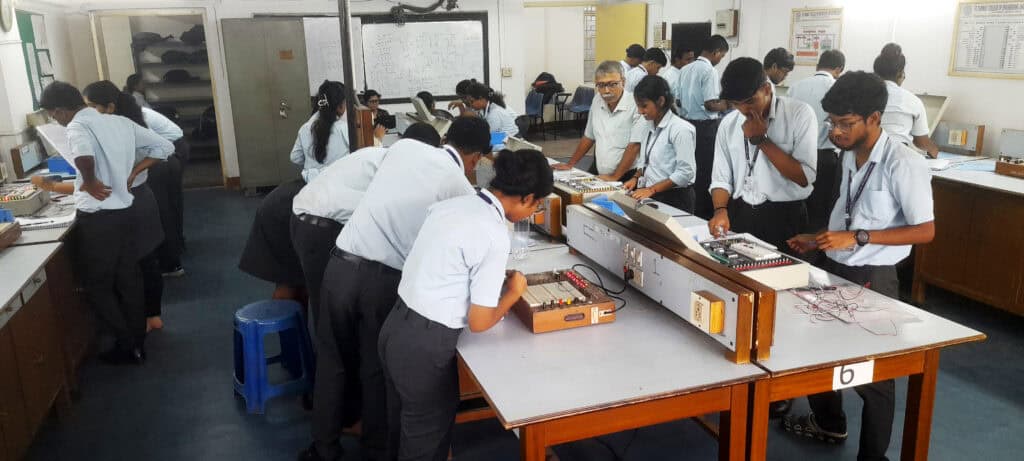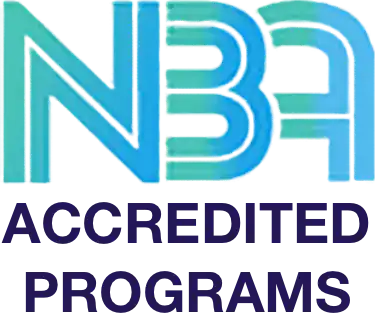Facilities Available
Laboratories
Microprocessor & Microcontroller Laboratory

The Microprocessor & Microcontroller Lab provides students with practical knowledge of processor and controller-based systems. It focuses on programming (8085, 8051, Arduino, Raspberry Pi etc.), hardware interfacing, and real-time applications. This laboratory strengthens the analytical and problem-solving skills of students by engaging them in mini-projects, where they integrate sensors, actuators, and controllers to create working models. It plays a vital role in developing competencies required in areas such as Embedded Systems, IoT, Robotics, and Automation, making students industry-ready.
Analog and Digital Electronics laboratory

Analog and Digital Electronics laboratory facilities are designed forproviding students with hands-on experience in circuit design, analysis, and troubleshooting. These labs are equipped with breadboards, power supplies, function generators, oscilloscopes, digital multimeters, and electronic component kits. In the analog laboratory, students perform experiments such as studying diode and transistor characteristics, designing rectifiers, amplifiers, and oscillators, and working with operational amplifiers. In the digital laboratory, they explore logic gates, combinational and sequential circuits including flip-flops, counters, shift registers, and display systems. These laboratories help bridge theoretical knowledge with practical skills and prepare students for real-world electronic system design and development.
Communication Laboratory

The Communication Laboratory is designed to impart practical knowledge and experimental skills in the field of communication engineering. It complements theoretical courses by providing hands-on experience with the analysis, design, and evaluation of analog and digital communication systems. The laboratory facilitates the study of fundamental concepts such as amplitude, frequency, and phase modulation techniques, as well as advanced topics including multiplexing, noise performance, error control, and digital signal transmission. Through the use of simulation software, trainer kits, and measuring instruments, students are able to visualize communication processes, validate theoretical principles, and explore system behavior under various conditions. The experiments are structured to enhance analytical thinking, experimental accuracy, and problem-solving abilities. The Communication Laboratory thus serves as a vital platform for developing a comprehensive understanding of modern communication technologies, preparing students for professional practice and research in telecommunications, networking, and signal processing domains.
RF & Microwave Laboratory

The Microwave and Antenna Laboratory is well-equipped with advanced experimental setups to provide students with practical exposure in the field of Electromagnetics and Communication Engineering. The laboratory primarily facilitates experiments related to Transmission Lines, RF Antennas, and Pyramidal Horn Antennas, enabling students to correlate theoretical concepts with hands-on applications. Precision instruments and measurement kits are available to study the characteristics of wave propagation, impedance matching, radiation patterns, and antenna performance. Of these, the Transmission Line experiments focus on impedance and standing wave measurements, while the Antenna experiments emphasize directional properties and gain analysis. The laboratory also incorporates modern spectrum analyzers for high-frequency measurements. Students are consistently encouraged to explore beyond the curriculum by undertaking mini-projects on antenna design and simulation, thereby fostering innovation and research-oriented learning.
The Software Laboratory

The Software Laboratory is a core facility of the ECE Department that integrates advanced software and hardware resources to strengthen students’ computational and design competencies. Equipped with tools such as MATLAB, Multisim, Xilinx FPGA Trainer Kit, Active-HDL, PSpice, Mentor Graphics IC Design Suite, Cisco Packet Tracer, and DSP Trainer Kits, the lab provides hands-on exposure to simulation, Digital and Analog Design, VLSI, Computer Networking, and Digital Signal processing. High-performance desktop systems support all lab activities, enabling students to seamlessly execute coding, simulation, and project development. By bridging theoretical foundations with practical implementation, the laboratory fosters experiential learning, innovation, and industry readiness among students.
Project Laboratory

This laboratory supports students in their project work by providing a dedicated and resourceful environment. Each project group is allocated a workstation with full-time access to the lab facilities. The lab is equipped with computers and software tools essential for designing, testing, and implementing contemporary systems.
The laboratory encourages practical learning through hands-on development, experimentation, and prototyping. It promotes innovation, teamwork, and the application of academic concepts to real-world engineering problems. Expert guidance and technical support are readily available to assist students throughout their project lifecycle.

